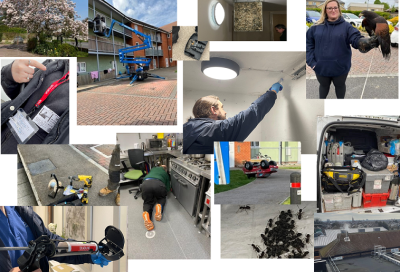Whoever first said, “you can’t understand someone until you’ve walked a mile in their shoes,” is now long since been forgotten, but those words are quoted, requoted, misquoted and paraphrased all the time. Why? Because they hold so much truth.
I’ve always thought it’s important for the left hand to know what the right is doing and so recently members of the office staff having been spending time with the field team. – in effect, walking in their shoes for a few hours. This hadn’t been possible in recent years because we’ve been strictly following government rules but, with the easing of social distancing guidance, Jeanette, our office manager, has been arranging for each member of the office staff to spend a day or more with someone in the field. We do this to ensure the team in the office has a real insight into what the technicians and surveyors are doing in the field.
Louise, Samantha, Mia and Vickie have all had the chance to follow a technician on a typical day and it was very interesting to read their feedback. Each of them is highly skilled in their day job and, compared to what a person in the street might know about pest control, they are experts, but I think every one of them would agree they didn’t really have a full grasp on what the job involves.
Running a healthy business
Businesses are a bit like bodies. The head is management – making decisions and considering overall strategy – the limbs are the technicians and surveyors who go out and see the clients, which makes admin staff the heart and soul. They are the first port of call for the client and often the last point of contact when making sure the invoice is correct and paid.
Admin staff are the day-to-day link between the client, management and the technician. They ensure field staff know where to go; what the client wants; and they help to ensure the technician has access to what they need to successfully fulfil a job.
If we didn’t have an excellent team of administrators, the business wouldn’t run smoothly and, to use the body analogy, it wouldn’t be healthy.
Where are they?
It’s a complaint most office staff will recognise – where are they? Why won’t they answer their phone? Why can’t they do the job we need them to?
This process has given the admin staff real insights into how the technicians actually operate and therefore why they can’t always do what the office wants. To paraphrase, I can see why, “it isn’t always easy [for them] to do what we want them to do when they are out and about.”
Another insight from Mia what that while it is vital that reports are completed on the day of the visit, it can also be quite difficult to complete them straight after the job – especially when the next customer may be waiting.
Having these kinds of insights doesn’t mean the technician can become lax but is does mean the admin staff have a better understanding of why things might, occasionally, be slightly delayed.
During their visits, the admin staff came face-to-face with dead mice, looked down a lot of drains, saw the detritus of 100 pigeons in a small roof space, identified ant nests, smelt a dead mouse before they found it, saw evidence of a clothes moth problem, and checked a lot, and I mean a lot, of bait boxes.
Apart from the fact it is was clear to all the admin staff that the technicians are constantly on the run, it also helped to reinforce the importance of getting as much information out the client as possible. The more insights they get from the client, the more they can tell the technician, the easier it is for the technician to do their job, and the happier the client will be.
That’s an important insight which I think applies to all businesses.
In the next few weeks, we’ll be publishing a couple of case studies that were produced by the admin teams after their visits.
